PUBH641: A Reflection on the Impact of Health Sciences Research
VerifiedAdded on 2023/06/11
|6
|1247
|78
Essay
AI Summary
This essay is a reflection on health sciences research, highlighting the author's understanding of quantitative and qualitative research methodologies, inductive and deductive reasoning, research ethics, and mixed methods approaches. The author discusses how learning about these concepts has expanded their existing skills and knowledge as a public health practitioner. Quantitative research is understood through the use of customer surveys to understand patient satisfaction and needs. Qualitative research is recognized for its exploratory nature, focusing on real-world contexts and human experiences. The importance of ethical considerations in research, including informed consent and protecting vulnerable populations, is emphasized. Finally, the essay touches on the integration of both qualitative and quantitative methods in health research. Desklib provides access to this and other solved assignments for students.
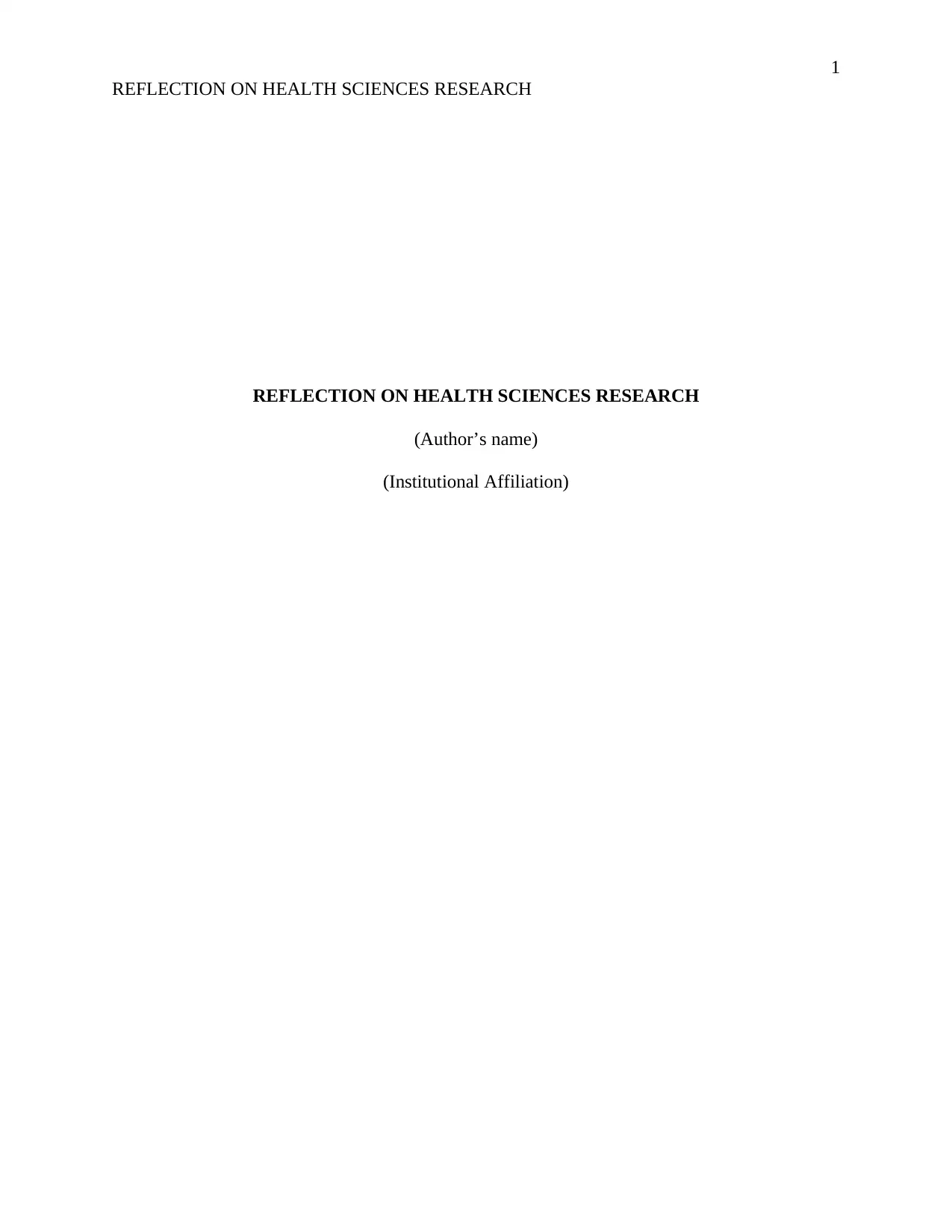
1
REFLECTION ON HEALTH SCIENCES RESEARCH
REFLECTION ON HEALTH SCIENCES RESEARCH
(Author’s name)
(Institutional Affiliation)
REFLECTION ON HEALTH SCIENCES RESEARCH
REFLECTION ON HEALTH SCIENCES RESEARCH
(Author’s name)
(Institutional Affiliation)
Paraphrase This Document
Need a fresh take? Get an instant paraphrase of this document with our AI Paraphraser
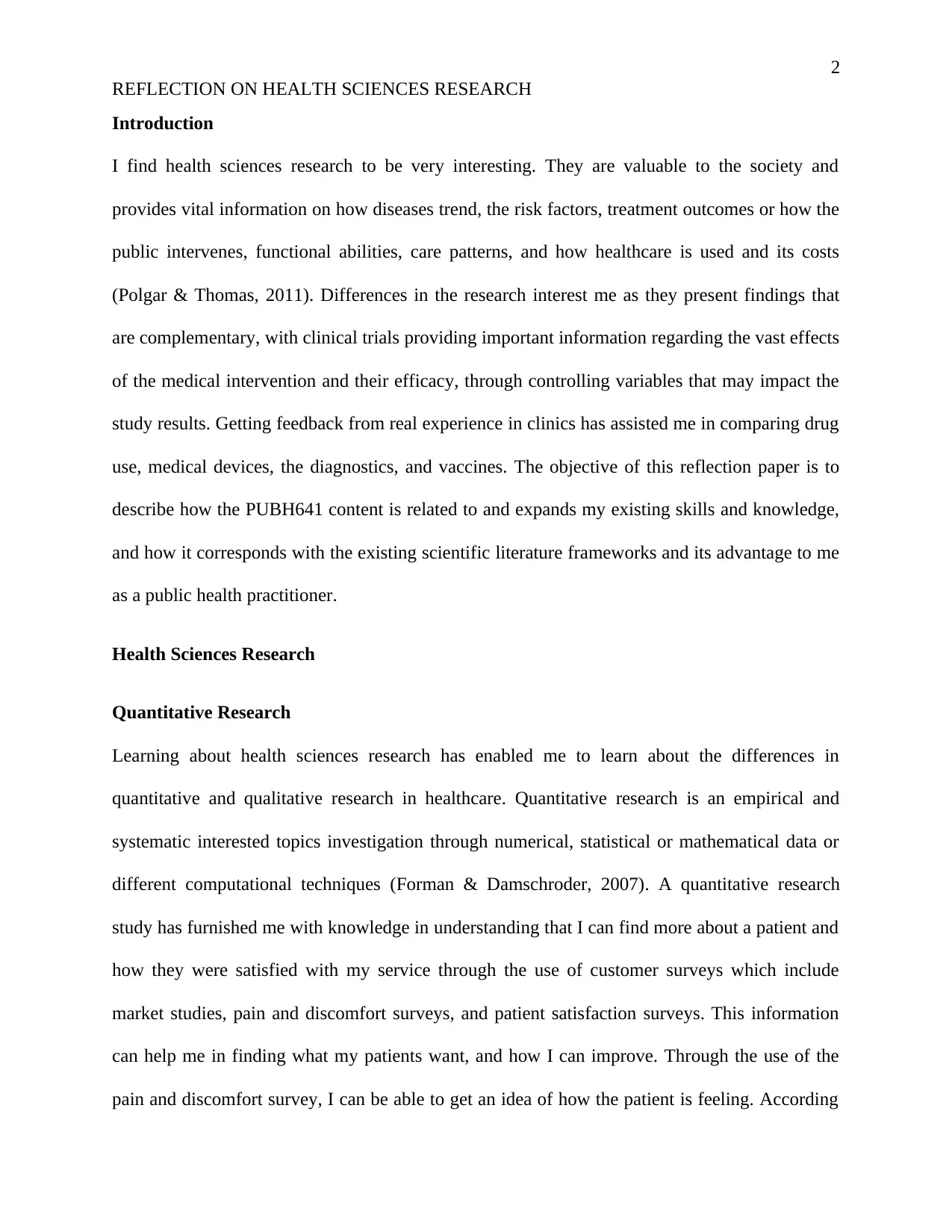
2
REFLECTION ON HEALTH SCIENCES RESEARCH
Introduction
I find health sciences research to be very interesting. They are valuable to the society and
provides vital information on how diseases trend, the risk factors, treatment outcomes or how the
public intervenes, functional abilities, care patterns, and how healthcare is used and its costs
(Polgar & Thomas, 2011). Differences in the research interest me as they present findings that
are complementary, with clinical trials providing important information regarding the vast effects
of the medical intervention and their efficacy, through controlling variables that may impact the
study results. Getting feedback from real experience in clinics has assisted me in comparing drug
use, medical devices, the diagnostics, and vaccines. The objective of this reflection paper is to
describe how the PUBH641 content is related to and expands my existing skills and knowledge,
and how it corresponds with the existing scientific literature frameworks and its advantage to me
as a public health practitioner.
Health Sciences Research
Quantitative Research
Learning about health sciences research has enabled me to learn about the differences in
quantitative and qualitative research in healthcare. Quantitative research is an empirical and
systematic interested topics investigation through numerical, statistical or mathematical data or
different computational techniques (Forman & Damschroder, 2007). A quantitative research
study has furnished me with knowledge in understanding that I can find more about a patient and
how they were satisfied with my service through the use of customer surveys which include
market studies, pain and discomfort surveys, and patient satisfaction surveys. This information
can help me in finding what my patients want, and how I can improve. Through the use of the
pain and discomfort survey, I can be able to get an idea of how the patient is feeling. According
REFLECTION ON HEALTH SCIENCES RESEARCH
Introduction
I find health sciences research to be very interesting. They are valuable to the society and
provides vital information on how diseases trend, the risk factors, treatment outcomes or how the
public intervenes, functional abilities, care patterns, and how healthcare is used and its costs
(Polgar & Thomas, 2011). Differences in the research interest me as they present findings that
are complementary, with clinical trials providing important information regarding the vast effects
of the medical intervention and their efficacy, through controlling variables that may impact the
study results. Getting feedback from real experience in clinics has assisted me in comparing drug
use, medical devices, the diagnostics, and vaccines. The objective of this reflection paper is to
describe how the PUBH641 content is related to and expands my existing skills and knowledge,
and how it corresponds with the existing scientific literature frameworks and its advantage to me
as a public health practitioner.
Health Sciences Research
Quantitative Research
Learning about health sciences research has enabled me to learn about the differences in
quantitative and qualitative research in healthcare. Quantitative research is an empirical and
systematic interested topics investigation through numerical, statistical or mathematical data or
different computational techniques (Forman & Damschroder, 2007). A quantitative research
study has furnished me with knowledge in understanding that I can find more about a patient and
how they were satisfied with my service through the use of customer surveys which include
market studies, pain and discomfort surveys, and patient satisfaction surveys. This information
can help me in finding what my patients want, and how I can improve. Through the use of the
pain and discomfort survey, I can be able to get an idea of how the patient is feeling. According
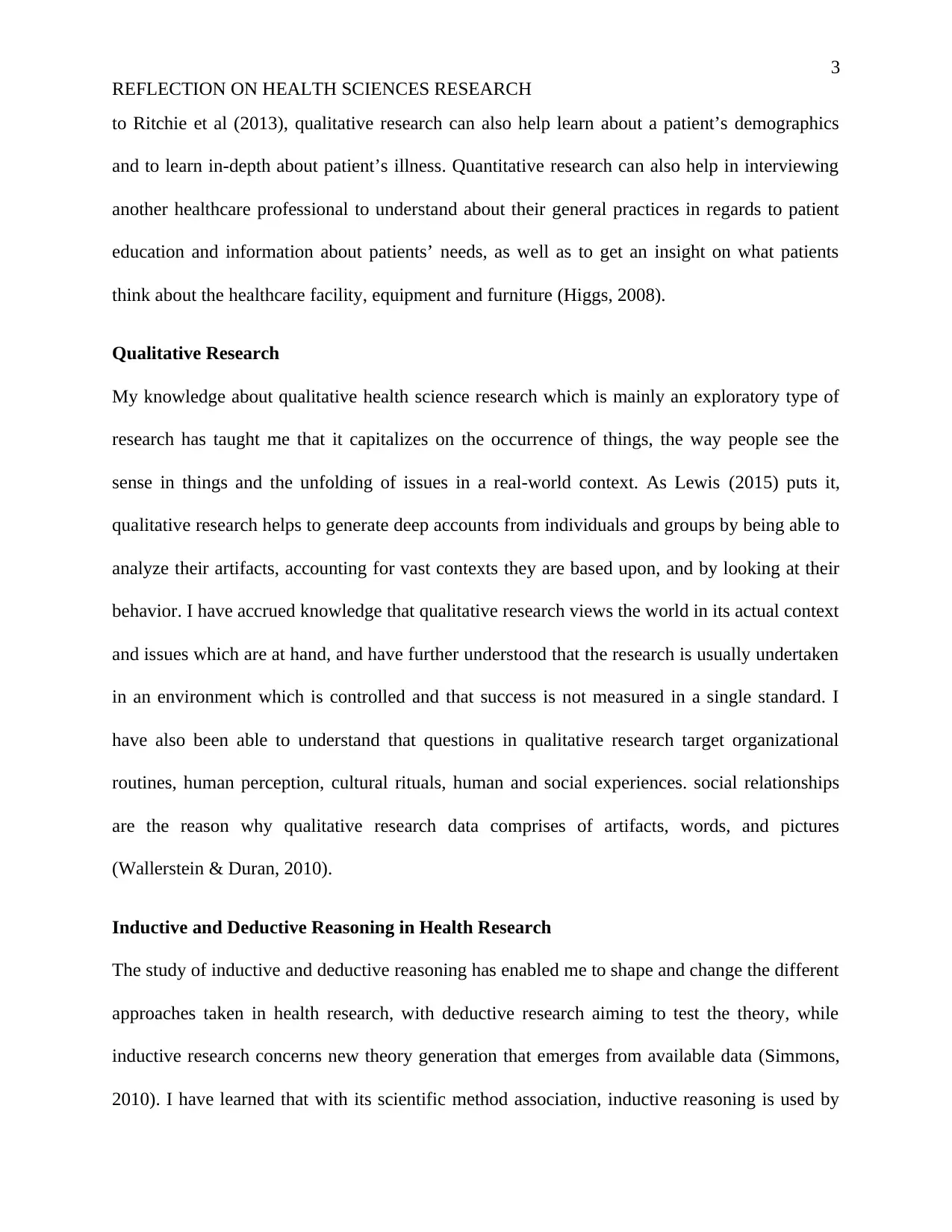
3
REFLECTION ON HEALTH SCIENCES RESEARCH
to Ritchie et al (2013), qualitative research can also help learn about a patient’s demographics
and to learn in-depth about patient’s illness. Quantitative research can also help in interviewing
another healthcare professional to understand about their general practices in regards to patient
education and information about patients’ needs, as well as to get an insight on what patients
think about the healthcare facility, equipment and furniture (Higgs, 2008).
Qualitative Research
My knowledge about qualitative health science research which is mainly an exploratory type of
research has taught me that it capitalizes on the occurrence of things, the way people see the
sense in things and the unfolding of issues in a real-world context. As Lewis (2015) puts it,
qualitative research helps to generate deep accounts from individuals and groups by being able to
analyze their artifacts, accounting for vast contexts they are based upon, and by looking at their
behavior. I have accrued knowledge that qualitative research views the world in its actual context
and issues which are at hand, and have further understood that the research is usually undertaken
in an environment which is controlled and that success is not measured in a single standard. I
have also been able to understand that questions in qualitative research target organizational
routines, human perception, cultural rituals, human and social experiences. social relationships
are the reason why qualitative research data comprises of artifacts, words, and pictures
(Wallerstein & Duran, 2010).
Inductive and Deductive Reasoning in Health Research
The study of inductive and deductive reasoning has enabled me to shape and change the different
approaches taken in health research, with deductive research aiming to test the theory, while
inductive research concerns new theory generation that emerges from available data (Simmons,
2010). I have learned that with its scientific method association, inductive reasoning is used by
REFLECTION ON HEALTH SCIENCES RESEARCH
to Ritchie et al (2013), qualitative research can also help learn about a patient’s demographics
and to learn in-depth about patient’s illness. Quantitative research can also help in interviewing
another healthcare professional to understand about their general practices in regards to patient
education and information about patients’ needs, as well as to get an insight on what patients
think about the healthcare facility, equipment and furniture (Higgs, 2008).
Qualitative Research
My knowledge about qualitative health science research which is mainly an exploratory type of
research has taught me that it capitalizes on the occurrence of things, the way people see the
sense in things and the unfolding of issues in a real-world context. As Lewis (2015) puts it,
qualitative research helps to generate deep accounts from individuals and groups by being able to
analyze their artifacts, accounting for vast contexts they are based upon, and by looking at their
behavior. I have accrued knowledge that qualitative research views the world in its actual context
and issues which are at hand, and have further understood that the research is usually undertaken
in an environment which is controlled and that success is not measured in a single standard. I
have also been able to understand that questions in qualitative research target organizational
routines, human perception, cultural rituals, human and social experiences. social relationships
are the reason why qualitative research data comprises of artifacts, words, and pictures
(Wallerstein & Duran, 2010).
Inductive and Deductive Reasoning in Health Research
The study of inductive and deductive reasoning has enabled me to shape and change the different
approaches taken in health research, with deductive research aiming to test the theory, while
inductive research concerns new theory generation that emerges from available data (Simmons,
2010). I have learned that with its scientific method association, inductive reasoning is used by
⊘ This is a preview!⊘
Do you want full access?
Subscribe today to unlock all pages.

Trusted by 1+ million students worldwide
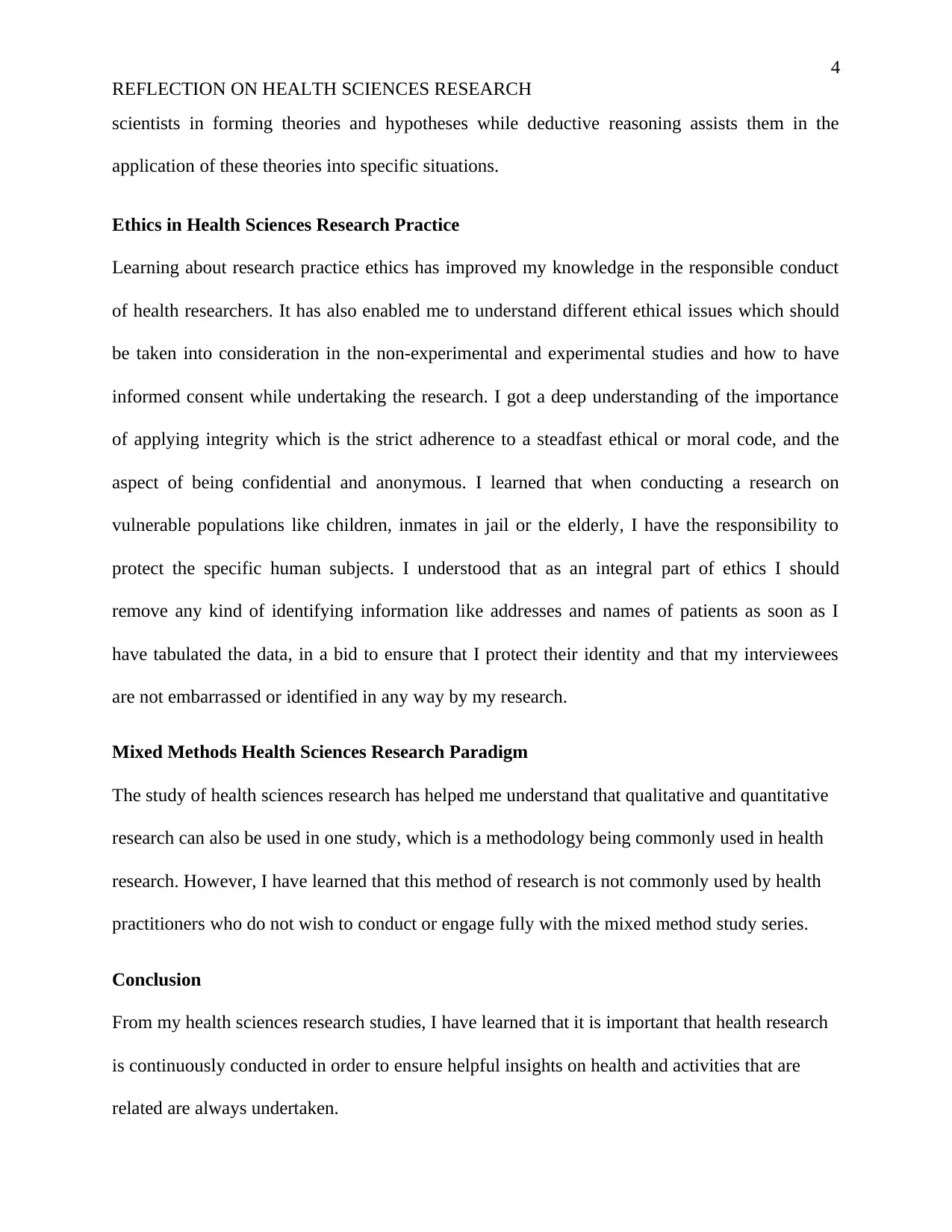
4
REFLECTION ON HEALTH SCIENCES RESEARCH
scientists in forming theories and hypotheses while deductive reasoning assists them in the
application of these theories into specific situations.
Ethics in Health Sciences Research Practice
Learning about research practice ethics has improved my knowledge in the responsible conduct
of health researchers. It has also enabled me to understand different ethical issues which should
be taken into consideration in the non-experimental and experimental studies and how to have
informed consent while undertaking the research. I got a deep understanding of the importance
of applying integrity which is the strict adherence to a steadfast ethical or moral code, and the
aspect of being confidential and anonymous. I learned that when conducting a research on
vulnerable populations like children, inmates in jail or the elderly, I have the responsibility to
protect the specific human subjects. I understood that as an integral part of ethics I should
remove any kind of identifying information like addresses and names of patients as soon as I
have tabulated the data, in a bid to ensure that I protect their identity and that my interviewees
are not embarrassed or identified in any way by my research.
Mixed Methods Health Sciences Research Paradigm
The study of health sciences research has helped me understand that qualitative and quantitative
research can also be used in one study, which is a methodology being commonly used in health
research. However, I have learned that this method of research is not commonly used by health
practitioners who do not wish to conduct or engage fully with the mixed method study series.
Conclusion
From my health sciences research studies, I have learned that it is important that health research
is continuously conducted in order to ensure helpful insights on health and activities that are
related are always undertaken.
REFLECTION ON HEALTH SCIENCES RESEARCH
scientists in forming theories and hypotheses while deductive reasoning assists them in the
application of these theories into specific situations.
Ethics in Health Sciences Research Practice
Learning about research practice ethics has improved my knowledge in the responsible conduct
of health researchers. It has also enabled me to understand different ethical issues which should
be taken into consideration in the non-experimental and experimental studies and how to have
informed consent while undertaking the research. I got a deep understanding of the importance
of applying integrity which is the strict adherence to a steadfast ethical or moral code, and the
aspect of being confidential and anonymous. I learned that when conducting a research on
vulnerable populations like children, inmates in jail or the elderly, I have the responsibility to
protect the specific human subjects. I understood that as an integral part of ethics I should
remove any kind of identifying information like addresses and names of patients as soon as I
have tabulated the data, in a bid to ensure that I protect their identity and that my interviewees
are not embarrassed or identified in any way by my research.
Mixed Methods Health Sciences Research Paradigm
The study of health sciences research has helped me understand that qualitative and quantitative
research can also be used in one study, which is a methodology being commonly used in health
research. However, I have learned that this method of research is not commonly used by health
practitioners who do not wish to conduct or engage fully with the mixed method study series.
Conclusion
From my health sciences research studies, I have learned that it is important that health research
is continuously conducted in order to ensure helpful insights on health and activities that are
related are always undertaken.
Paraphrase This Document
Need a fresh take? Get an instant paraphrase of this document with our AI Paraphraser
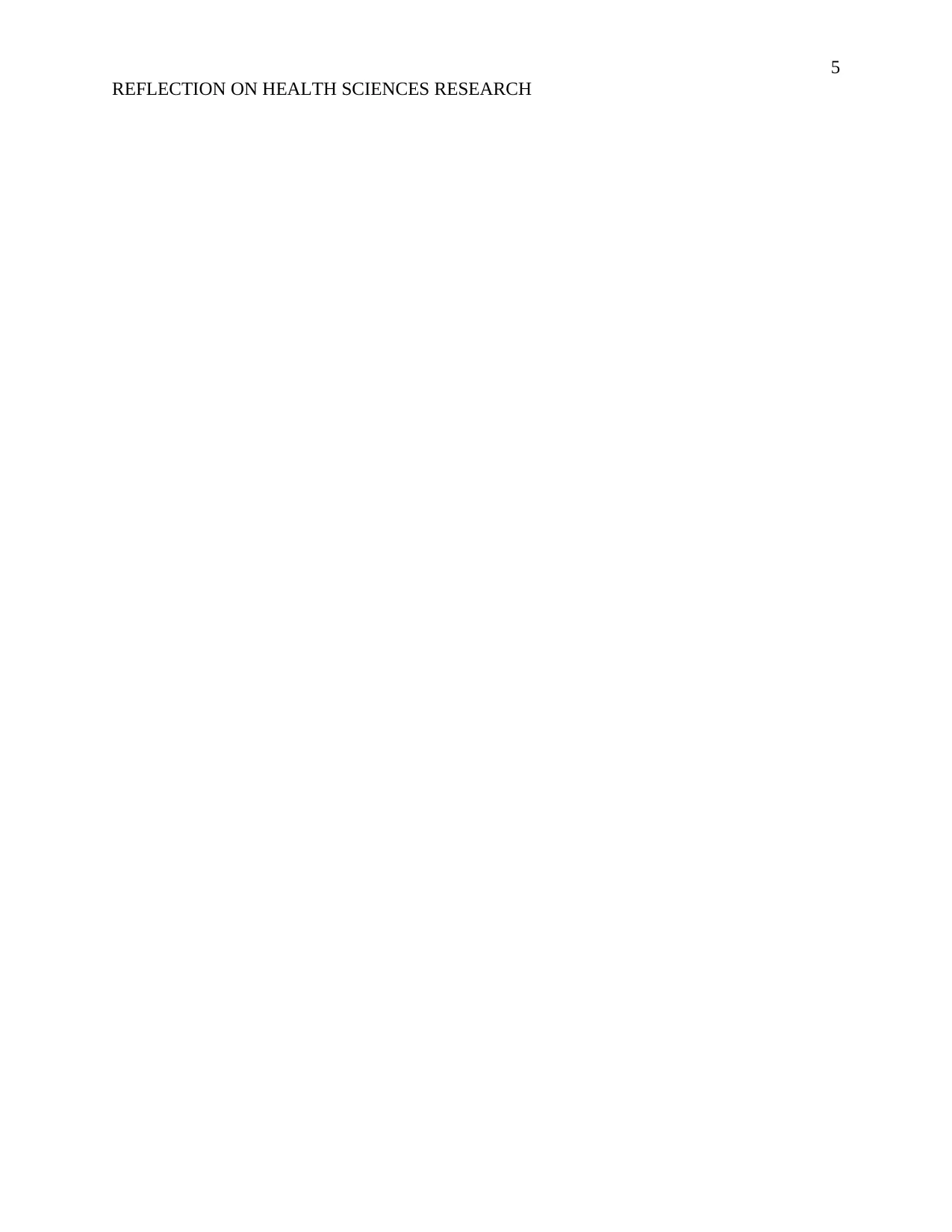
5
REFLECTION ON HEALTH SCIENCES RESEARCH
REFLECTION ON HEALTH SCIENCES RESEARCH
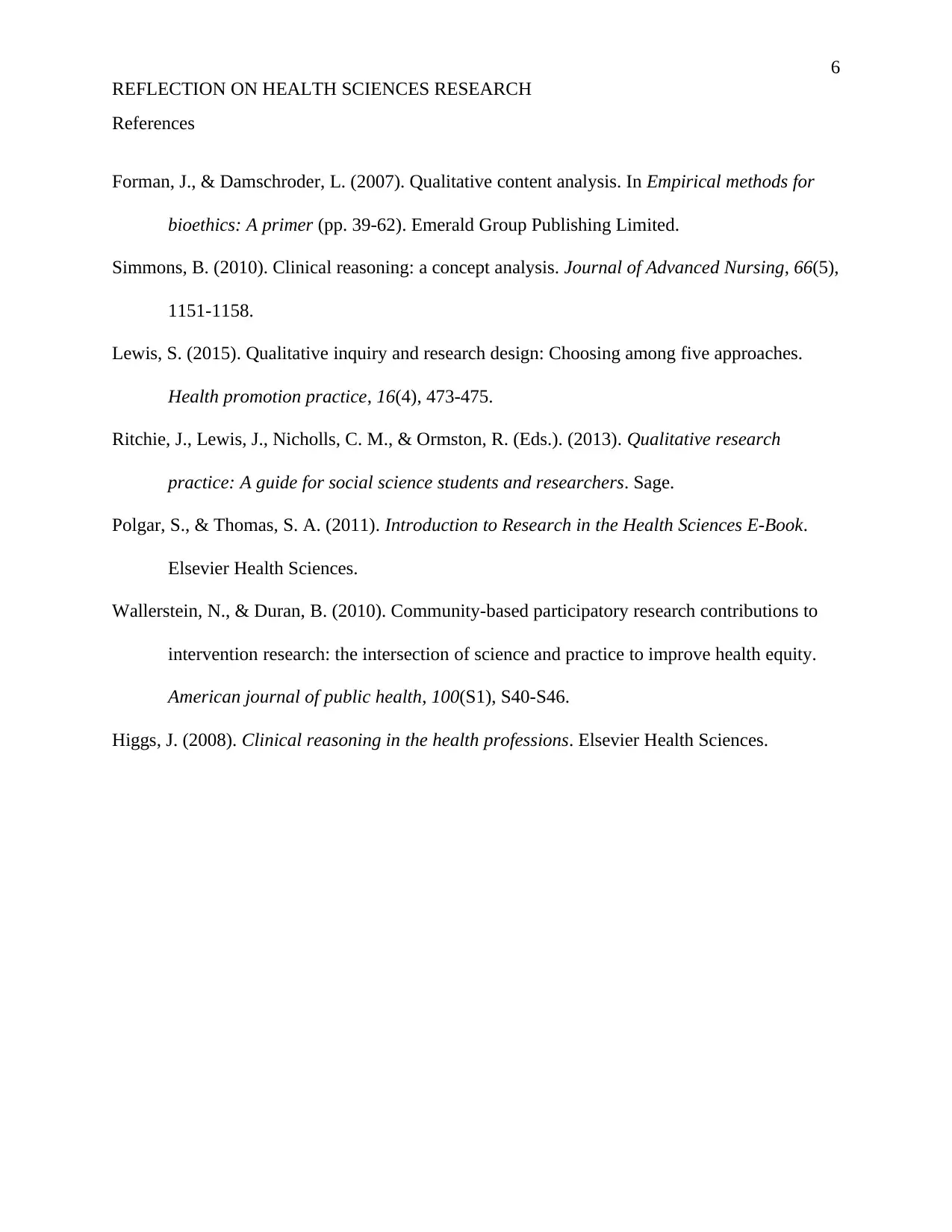
6
REFLECTION ON HEALTH SCIENCES RESEARCH
References
Forman, J., & Damschroder, L. (2007). Qualitative content analysis. In Empirical methods for
bioethics: A primer (pp. 39-62). Emerald Group Publishing Limited.
Simmons, B. (2010). Clinical reasoning: a concept analysis. Journal of Advanced Nursing, 66(5),
1151-1158.
Lewis, S. (2015). Qualitative inquiry and research design: Choosing among five approaches.
Health promotion practice, 16(4), 473-475.
Ritchie, J., Lewis, J., Nicholls, C. M., & Ormston, R. (Eds.). (2013). Qualitative research
practice: A guide for social science students and researchers. Sage.
Polgar, S., & Thomas, S. A. (2011). Introduction to Research in the Health Sciences E-Book.
Elsevier Health Sciences.
Wallerstein, N., & Duran, B. (2010). Community-based participatory research contributions to
intervention research: the intersection of science and practice to improve health equity.
American journal of public health, 100(S1), S40-S46.
Higgs, J. (2008). Clinical reasoning in the health professions. Elsevier Health Sciences.
REFLECTION ON HEALTH SCIENCES RESEARCH
References
Forman, J., & Damschroder, L. (2007). Qualitative content analysis. In Empirical methods for
bioethics: A primer (pp. 39-62). Emerald Group Publishing Limited.
Simmons, B. (2010). Clinical reasoning: a concept analysis. Journal of Advanced Nursing, 66(5),
1151-1158.
Lewis, S. (2015). Qualitative inquiry and research design: Choosing among five approaches.
Health promotion practice, 16(4), 473-475.
Ritchie, J., Lewis, J., Nicholls, C. M., & Ormston, R. (Eds.). (2013). Qualitative research
practice: A guide for social science students and researchers. Sage.
Polgar, S., & Thomas, S. A. (2011). Introduction to Research in the Health Sciences E-Book.
Elsevier Health Sciences.
Wallerstein, N., & Duran, B. (2010). Community-based participatory research contributions to
intervention research: the intersection of science and practice to improve health equity.
American journal of public health, 100(S1), S40-S46.
Higgs, J. (2008). Clinical reasoning in the health professions. Elsevier Health Sciences.
⊘ This is a preview!⊘
Do you want full access?
Subscribe today to unlock all pages.

Trusted by 1+ million students worldwide
1 out of 6
Related Documents
Your All-in-One AI-Powered Toolkit for Academic Success.
+13062052269
info@desklib.com
Available 24*7 on WhatsApp / Email
![[object Object]](/_next/static/media/star-bottom.7253800d.svg)
Unlock your academic potential
Copyright © 2020–2026 A2Z Services. All Rights Reserved. Developed and managed by ZUCOL.




